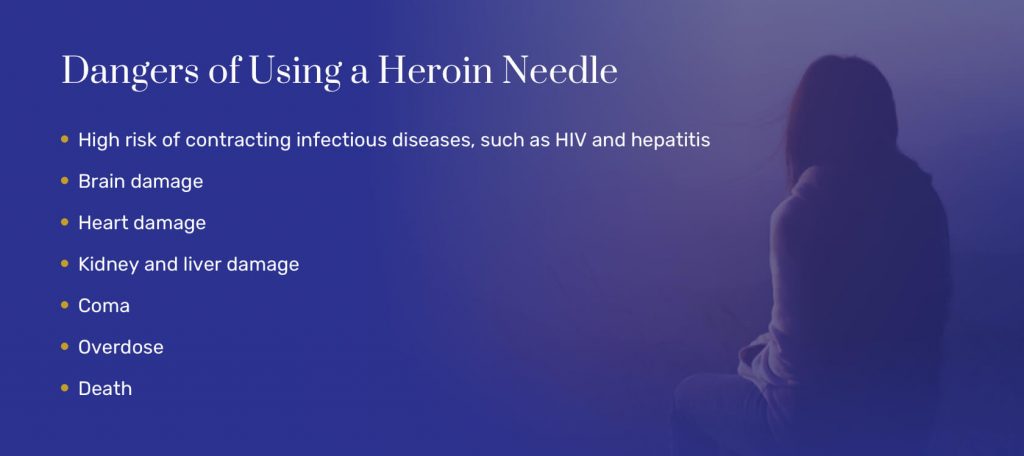Identifying a heroin syringe may one day help you recognize and get out of an undesirable situation as well as help you identify if someone you know or care about is impacted by the drug.
Heroin is a highly addictive drug that gives a short burst or rush of a euphoric high when injected intravenously (into the veins) or under the skin (skin popping).
Although heroin can be ingested in a few different ways, injection is the most common way for people 35 and older. Injecting heroin is said to give the end user the euphoric high they are looking for far more quickly than any other method of taking the drug.
What Does a Heroin Needle Look Like?
Some heroin needles look exactly like the instruments used to draw blood because that is exactly what they are.
Other heroin needles can be much smaller instruments that generally have attached needles, although not all of these instruments have permanently attached needles. Heroin syringes often have much smaller tubes or barrels than medical hypodermic needles that are commonly used to draw blood.
Why Do People Use a Needle?
While some drug users are avid about not injecting into their veins, a wide number of heroin users actually prefer the injectable version of the drug.
Heroin can be ingested in three primary ways. It can be smoked, snorted, or injected.
Injection, although more labor-intensive in terms of preparation for use, gives the end user the quickest and most powerful way to experience the euphoric high that is being sought.
When smoked or snorted, the effect of heroin takes approximately 10 to 15 minutes to occur. When injected into a vein, the effect takes 6 to 8 seconds to occur.
Types & Sizes of Heroin Needles
Heroin needles are usually found in two different configurations.
Standard Insulin & Standard Tuberculin
Heroin needles can be found in a standard insulin set (which is 27 gauge or 28 gauge with an orange cap) as well as a standard tuberculin set (which is 25 gauge with a blue tip).
Higher Gauge Needles
Higher gauge needles are generally thinner, and these are often considered preferable for those planning on injecting into delicate veins. When a heroin user begins to lose the ability to inject into larger veins due to vein collapse, they will seek out smaller veins, such as those found on the hands and feet.
Other Objects Commonly Used With Heroin Needles
Some objects that are normally not associated with drug use necessarily are often found and used along with heroin needles. As a result, these things can be considered paraphernalia in some respect. Here are some examples:
- Lighters
- Matches
- Spoons
- Shoelaces
- Cotton balls
- Cigarette filters
Lighters and matches are used to process or “cook” the raw heroin to liquefy it for injection. Spoons are used to hold the raw heroin so indirect heat can be applied. A lighter is often held underneath the smooth to heat the heroin.
Shoelaces are used to tie off the arm. This redirects blood flow and causes the vein chosen to pop up, making injection easier.
Cotton balls and cigarette filters are used to filter heroin. The drug is drawn through the filter or cotton ball in an effort to filter out impurities that are still left in the heroin after processing.

What Are the Dangers of Using a Heroin Needle?
There are numerous dangers inherent in injecting heroin. These dangers don’t necessarily deter use since injection use is the primary way heroin is used today. This is simply because it produces the fastest and most powerful high.
Some of the dangers of injecting heroin include the following:
- High risk of contracting infectious diseases, such as HIV and hepatitis
- Brain damage
- Heart damage
- Kidney and liver damage
- Coma
- Overdose
- Death
- Factors That Influence the Characteristics of Needles and Syringes Used by People Who Inject Drugs in Tajikistan. (October 2015). Harm Reduction Journal.
- Drug Paraphernalia Laws Undermine Harm Reduction. (June 2022). Cato Institute.
- Infectious Diseases and Injection Drug Use: Public Health Burden and Response. (September 2020). The Journal of Infectious Diseases.
- The Physical Health of People Who Inject Drugs: Complexities, Challenges, and Continuity. (June 2016). British Journal of General Practice.
- Increases in Acute Hepatitis C Virus Infection Related to a Growing Opioid Epidemic and Associated Injection Drug Use, United States, 2004 to 2014. (February 2018). AJPH.




